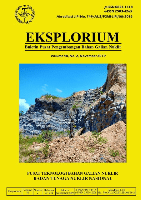
Eksplorium-Buletin Pusat Teknologi Bahan Galian Nuklir
Scope & Guideline
Pioneering Research in Nuclear Material Technology
Introduction
Aims and Scopes
- Geological Exploration and Characterization:
The journal emphasizes the exploration and characterization of geological materials, particularly those relevant to nuclear energy, such as uranium and thorium, along with rare earth elements, which are essential for various technological applications. - Environmental Geochemistry and Remediation:
Research on the environmental impact of mining and industrial activities, including studies on pollution and remediation techniques, such as phytoremediation, is a key focus area, reflecting the journal's commitment to sustainable practices. - Geophysical and Geochemical Methodologies:
The publication showcases innovative methodologies in geophysics and geochemistry, including gravimetry, seismic tomography, and analytical validation techniques, to enhance the understanding of geological structures and mineral resources. - Resource Management and Sustainability:
A consistent focus on the sustainable management of mineral resources, including waste management and land suitability analysis for mining activities, highlights the journal's dedication to responsible resource utilization. - Interdisciplinary Research:
The journal promotes interdisciplinary studies that integrate geology, environmental science, and engineering, fostering collaborations that address complex challenges in resource exploration and management.
Trending and Emerging
- Rare Earth Element Research:
There is a significant increase in studies focusing on the distribution, characteristics, and extraction of rare earth elements, driven by their rising importance in technology and renewable energy sectors, reflecting a global trend towards resource diversification. - Environmental Impact Studies:
Emerging themes related to environmental impacts of mining activities, particularly studies on pollution and remediation strategies, are gaining traction, indicating a heightened awareness of sustainable practices in resource management. - Geophysical Data Utilization:
The use of advanced geophysical methods, such as satellite gravity data and seismic tomography, is on the rise, showcasing a trend towards integrating high-tech solutions in geological research and exploration. - Interdisciplinary Approaches to Resource Management:
There is a growing trend towards interdisciplinary research that combines geology, environmental science, and engineering, aiming to address complex challenges in resource management and environmental sustainability. - Geochemical Exploration Techniques:
Innovative geochemical exploration methods are increasingly prevalent, particularly in identifying mineralization prospects and assessing geological formations, which aligns with the current demand for efficient resource identification.
Declining or Waning
- Traditional Geology without Technological Integration:
Research that solely focuses on traditional geological studies without the integration of modern technological methods, such as advanced geophysical techniques or environmental assessments, has become less prominent, as the field moves towards more technologically sophisticated approaches. - General Mineralogy Studies:
Broad mineralogy studies that do not connect to specific applications or advanced techniques are declining. The journal appears to be favoring more focused research that directly addresses practical applications, particularly in nuclear technology and environmental sustainability. - Static Geological Mapping:
The emphasis on static geological mapping, which lacks dynamic assessments or the application of modern data analytics, is waning, as there is a growing preference for studies that utilize real-time or high-resolution data to inform geological assessments.
Similar Journals

DOKLADY EARTH SCIENCES
Shaping the Future of Earth Science ExplorationDOKLADY EARTH SCIENCES is a reputable journal published by MAIK NAUKA/INTERPERIODICA/SPRINGER, focusing on the dynamic field of Earth and Planetary Sciences. With an ISSN of 1028-334X and E-ISSN 1531-8354, this journal offers a platform for researchers to disseminate their findings and insights that contribute to our understanding of Earth systems over a continuous publishing span from 1998 to 2024. It currently holds a Q3 quartile ranking in the Earth and Planetary Sciences category, reflecting an emerging yet significant impact within its field, evidenced by its Scopus ranks where it stands at 123rd in general Earth sciences and 113th in miscellaneous Earth sciences. DOKLADY EARTH SCIENCES aims to bridge research gaps and foster collaboration among a diverse audience including researchers, professionals, and students committed to advancing knowledge in geoscience. The journal stands as a vital resource for those seeking to explore contemporary challenges and innovations within the realm of Earth sciences.

LITHOLOGY AND MINERAL RESOURCES
Bridging Knowledge Gaps in Mineral ExplorationLITHOLOGY AND MINERAL RESOURCES, published by PLEIADES PUBLISHING INC, is a specialized journal dedicated to advancing knowledge in the fields of economic geology, geochemistry, and petrology. With its ISSN 0024-4902 and E-ISSN 1608-3229, this journal has established itself as a critical resource for scholars and practitioners alike, examining the intricate relationships between lithology and mineral deposits, and their implications for resource management. As indicated by its positioning in the Q3 quartile for both economic geology and geochemistry and petrology in 2023, the journal is recognized for its valuable contributions to the scientific community, ranking #28 out of 43 in Economic Geology and #112 out of 154 in Geochemistry and Petrology according to Scopus. The journal's publication history reveals a rich tradition of excellence, as it has been continuously contributing to the field from 1984 to 2024. While it does not offer open access options, researchers and practitioners can easily engage with its robust body of work in effective ways to support their own studies and applications. The importance of LITHOLOGY AND MINERAL RESOURCES lies in its commitment to publishing high-quality research that informs practices in mineral exploration and environmental stewardship, making it an essential resource for anyone invested in the future of earth sciences.

Journal of Mining Institute
Exploring Sustainable Solutions in Geotechnical EngineeringThe Journal of Mining Institute, published by SAINT-PETERSBURG MINING UNIVERSITY, stands as a premier platform for disseminating cutting-edge research in the fields of Economic Geology, Geology, and Geotechnical Engineering. With an impressive Q1 ranking in various quartiles for 2023, this journal offers enlightening insights into earth sciences, reflecting its substantial impact within the academic community. The journal, accessible in open access format since 1975, ensures that researchers, professionals, and students can readily access high-quality research articles. The ISSN for the print version is 2411-3336 and E-ISSN 2541-9404, supporting its reach both online and offline. As it converges knowledge from 2017 to 2024, the Journal of Mining Institute serves as an essential resource for understanding contemporary challenges and innovations in mining and geology, encouraging a collaborative exploration of sustainable practices and technological advancements in these critical fields.
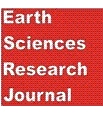
Earth Sciences Research Journal
Bridging Research and Real-World SolutionsThe Earth Sciences Research Journal, published by the UNIV NACIONAL DE COLOMBIA, serves as a pivotal platform for the dissemination of knowledge in the diverse field of Earth and Planetary Sciences since its inception. With an ISSN of 1794-6190 and an E-ISSN of 2339-3459, this Open Access journal has been committed to providing unrestricted access to high-quality research since 2004. Located in Bogotá, Colombia, it has gained recognition within the academic community, achieving a Q3 quartile ranking in Earth and Planetary Sciences and notable Scopus rankings, which further underscores its relevance and reach. Its scope encompasses varied research topics, making it an essential resource for researchers, professionals, and students alike, seeking to contribute to or stay informed on the latest developments in the Earth sciences up to the year 2024. The journal not only anticipates cutting-edge research but also emphasizes collaborative dialogues among global experts, driving forward the conversation on critical issues facing our planet.

Frontiers of Earth Science
Transforming Understanding of Planetary ProcessesFrontiers of Earth Science is a prominent academic journal in the field of Earth and Planetary Sciences, published by Springer. With an ISSN of 2095-0195 and an E-ISSN of 2095-0209, this journal serves as a significant platform for researchers and professionals to disseminate their findings from 2007 to 2024. It is recognized for its impactful contributions within the category of Earth and Planetary Sciences, boasting a respected Q2 ranking in 2023. With a Scopus ranking of 64 out of 195, placing it in the 67th percentile, Frontiers of Earth Science continues to drive academic dialogue and innovation. The journal is dedicated to exploring a diverse range of topics, including geology, meteorology, and environmental science, and amplifying the understanding of Earth systems through rigorous research. Located in New York, USA, this journal embraces an Open Access model, ensuring that groundbreaking research is readily available to the global scientific community, thereby enhancing its accessibility and impact.

Journal of Himalayan Earth Sciences
Unlocking the Secrets of the Himalayan GeosphereThe Journal of Himalayan Earth Sciences (ISSN: 1994-3237; E-ISSN: 2305-6959) is a distinguished publication by UNIV PESHAWAR, dedicated to advancing knowledge in the field of earth sciences, particularly as they relate to the Himalayan region. Established in 2013, this journal aims to provide a platform for researchers, professionals, and students to share original research findings, reviews, and innovative methodologies that contribute to the understanding of geological and environmental phenomena in this ecologically significant area. Despite being categorized in Q4 of the Earth and Planetary Sciences, the journal showcases valuable contributions to the scientific community and encourages submissions that delve into both the challenges and advancements within Earth sciences, with a particular focus on the unique geological structures and processes of the Himalayas. As an open-access journal, it ensures that research is accessible to a global readership, promoting collaboration and discussion among scholars and practitioners. The journal's operational base in Peshawar, Pakistan, places it at the heart of Himalayan research, making it an invaluable resource for those invested in earth sciences.
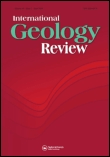
INTERNATIONAL GEOLOGY REVIEW
Fostering a deeper understanding of Earth's processes and materials.INTERNATIONAL GEOLOGY REVIEW, published by Taylor & Francis Inc, is a premier journal dedicated to advancing the field of geology since its inception in 1959. With its Q1 ranking in the field of Geology for 2023, this journal is a significant platform for researchers, professionals, and students exploring the intricacies of Earth and planetary sciences. The journal has been rated in the 81st percentile within Scopus rankings, reflecting its influence and the high quality of articles published. Although it does not offer Open Access options, the journal maintains a rigorous peer-review process to ensure the publication of original and impactful research. With an extensive archive projected to continue until 2024, INTERNATIONAL GEOLOGY REVIEW serves as an essential resource for those seeking to deepen their understanding of geological phenomena, making it a vital contributor to the global scientific community.

Visnyk of Taras Shevchenko National University of Kyiv-Geology
Uncovering the Depths of Geology through Academic ExcellenceVisnyk of Taras Shevchenko National University of Kyiv-Geology is a premier academic journal dedicated to advancing the field of geology and related earth sciences. Published by the esteemed NATL TARAS SHEVCHENKO UNIV KYIV, this journal serves as a vital platform for researchers, professionals, and students to disseminate original research findings, innovative methodologies, and comprehensive reviews that address contemporary geological challenges. With an ISSN of 1728-2713 and an E-ISSN of 2079-9063, the journal is committed to upholding rigorous academic standards and excellence, although it currently operates without an open access model. The Visnyk primarily focuses on topics such as mineralogy, geophysics, geological engineering, and environmental geology, thus providing a broad spectrum of insights into the ever-evolving discipline of geology. Situated in Kyiv, Ukraine, it not only fosters local research but also contributes to the global geological discourse, making it an indispensable resource for anyone engaged in earth sciences.
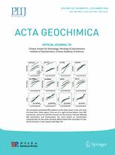
Acta Geochimica
Unveiling the Mysteries of Earth and Beyond.Acta Geochimica is a prominent academic journal published by SPRINGER INT PUBL AG, focusing on the dynamic fields of Geochemistry and Petrology. Established in 2016, this peer-reviewed publication has quickly gained recognition within the scientific community, currently holding a category quartile ranking of Q3 in Geochemistry and Petrology as of 2023. With its ISSN 2096-0956 and E-ISSN 2365-7499, the journal offers a platform for researchers and professionals to disseminate and discuss significant advancements in the study of the chemical composition of the Earth and other celestial bodies. While it is not an open-access journal, Acta Geochimica plays a vital role in fostering collaboration and innovation among scientists, contributing to a deeper understanding of geochemical processes. Located in Switzerland at Gewerbestrasse 11, Cham CH-6330, Switzerland, this journal is a critical resource for students, researchers, and professionals seeking to push the boundaries of knowledge in Earth sciences.
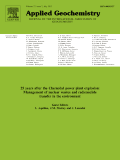
APPLIED GEOCHEMISTRY
Advancing Understanding of Geochemical Processes and PollutionApplied Geochemistry is an esteemed peer-reviewed journal published by Pergamon-Elsevier Science Ltd, dedicated to advancing the field of geochemistry by exploring the intricate relationships between geological processes and environmental chemistry. With a significant impact factor and prestigious standing in various categories, including Environmental Chemistry, Geochemistry and Petrology, and Pollution, Applied Geochemistry is classified within the Q2 quartile, reflecting its influence and recognition in the scientific community. The journal spans research contributions from 1986 to the present, focusing on critical issues such as the impact of geochemical processes on the environment, the evaluation of pollution sources, and innovative methodologies in geochemical analysis. Through its rigorous publication standards, Applied Geochemistry serves as a vital resource for researchers, professionals, and students seeking to enrich their understanding of geochemical phenomena and their implications for environmental health. Please note that access to the journal is not open; therefore, institutional or individual subscriptions may be required for full-text viewing.